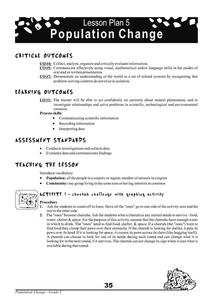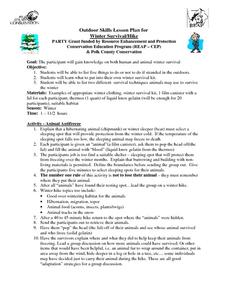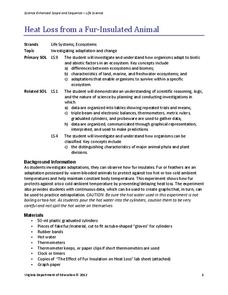Livaudais-Baker English Classroom
Stranded!
Imagine being stranded on a remote island with no one else but your team members. That is the scenario facing groups who must decide how they will survive. The good news is that groups get to design their part of the island, choose how...
Curated OER
Artificial Selection
The second lesson in the series begins with a starter activity discussing wild versus domesticated animals. Then, scholars play a card game, with optional variations, to emphasize artificial selection. Next, they attend a field trip to a...
Cheetah Outreach
Population Change
Your youngsters become cheetahs in search of food, water, shelter, and space in a fun physical game that does a fantastic job of representing fluctuating species population based on resources available over years.
Howard Hughes Medical Institute
Survival of the Fittest - Variations in the Clam Species Clamys sweetus
It's not often that you come across a clever laboratory activity that is both imaginative and comprehensive! Using M&M's and Reese's peanut butter candies to represent two different clam species, young biologists test for "relative...
University of Pennsylvania
Evolution by Natural Selection
A diagram, data table, and reading passage top this resource. Through it, biology beginners are introduced to the concept of natural selection. They answer some questions and then participate in a simulation using fabric as a habitat and...
Smithsonian Institution
Expedition: Insects
Get up close and personal with beautiful and sometimes dangerous insects in an exciting eBook activity! Pupils practice geography skills by reading a map with the location of six different insects. Scientists read about each insect,...
American Museum of Natural History
Crazy Camouflage
Scholars discover the crazy camouflage technique of the flounder fish. After reading three informative paragraphs, participants follow steps to make a model of the sea creature.
American Museum of Natural History
Endangered Species Game
Multiple factors affect the survival of endangered species. A hands-on activity has learners explore those factors. They play a board game that highlights factors such as human influence, habitat availability, and new species introduction.
National Wildlife Federation
What's Your Habitat?
How do human habitats compare to animal habitats? Individuals begin their nature discovery by drawing their own habitats that extend beyond their houses. Pupils ensure their drawings include the four habitat elements of food, water,...
National Wildlife Federation
Habitat Hunt
Put yourselves in their shoes—or, in this case, their paws. Learners assume the role of an animal and scan a habitat looking for features to fulfill their basic needs. Based on their findings, they decide if the habitat is a suitable...
Council for Economic Education
How Neolithic Farmers Increased Their Standard of Living
How do people improve their economic situations? While many learners may not consider questions about how many crops to grow in ancient times were economic decisions, a hands-on activity encourages individuals to make these connections....
Reed Novel Studies
My Side of The Mountain: Novel Study
Some money, a pocketknife, a ball of cord, and some flint and steel ... is that enough for a 14-year-old to survive alone in the wilderness? Scholars explore the topic of survival with the novel study for My Side of the Mountain....
Science Matters
Formative Assessment #2
Learners work collaboratively to predict what life would be like as an Arctic Hare. Teams go on a hunt where scholars role play an owl, white hares, and gray hares. Independently, pupils record their findings and reflect on their...
Science Matters
Blubber Gloves: It’s All About Insulation
Instill the concept of adaptation with the help of Blubber Gloves—ziplock bags, shortening, and duct tape. Scholars discuss how animals and plants keep warm in polar regions, record their predictions, and try on their Blubber Gloves to...
K5 Learning
Survival in the Wild
How do animals survive in the wild? Read about the different adaptations such as camouflage and self-protection that animals use to survive.
Teach Engineering
Building and Testing Model Underground Safety Caverns
Teams take their cavern designs and build a model from clay or paper mache that can be buried in sand. Testing involves dropping a bowling ball on the buried cavern. Teams dig out their cavern, inspect it for damage, and consider...
Louisiana Department of Education
Hatchet
Accompany a novel study of Hatchet by Gary Paulson with a unit consisting of 16 lessons focused on physical and emotional survival. Reading the story along with a variety of informational texts, scholars compare and contrast reading...
Outdoor Learning Center
Outdoor Survival
Which of the following can you survive without for the longest time: water, food, or a positive mental attitude? The answer may surprise you. Guide learners of all ages through games, activities, and discussions about surviving in the...
Polk County Education
Winter Survival/Hike
Hibernation isn't just about staying fed, it's about staying warm. Young environmentalists explore the importance of staying warm in the wilderness with a short lesson about surviving in the wild. Using gelatin to represent warm-blooded...
Calvin Crest Outdoor School
Survival
Equip young campers with important survival knowledge with a set of engaging lessons. Teammates work together to complete three outdoor activities, which include building a shelter, starting a campfire, and finding directions in the...
Province of Manitoba
The Outdoors Camping and Survival Skills
Equip young campers with the tips and strategies for a safe trip to the outdoors with a series of lessons. They learn how to start fires with and without firewood, keep warm in snowy weather, and purify water to make it safe for drinking.
Stanislaus State University of California
Survival Skills 101
Prepare individuals for any type of survival situation with a presentation that focuses on basic survival skills. With a variety of how-to's, including the best ways to treat injuries, the importance of staying...
Virginia Department of Education
Heat Loss from a Fur-Insulated Animal
How do animals adapt to weather changes? Provide your class with the ability to understand adaptations and body temperature as they participate in this hands on experiment, using fake fur and hot water. Pupils collect data and...
National Wildlife Federation
What's Your Habitat?
How are third graders like rabbits? They both live in habitats and require food, water, and shelter to survive! An educational science lesson encourages your learners to think about their own habitats and survival needs, before comparing...

























